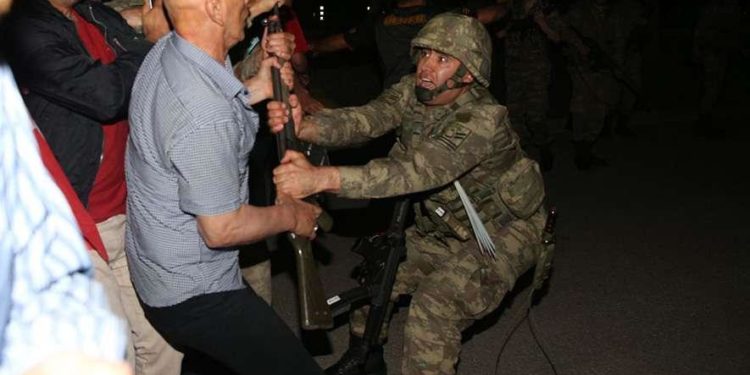The 42-page “July 15 supposed coup attempt in 10 questions and the Fethullah terrorist organization” article was published on the Presidency website, which described the “KCK cases” as “framing cases”, where Kurdish politicians, lawyers and journalists were tried and sentenced for hundreds of years.
According to the Presidency, ‘KCK cases’ were FETÖ’s verdict
A 42-page file was published on the Presidential website on the anniversary of the July 15 military coup. Named “10 questions July 15 coup attempt and Fettullah terrorist organization,” a document was published, which disclosed that “Feto” would attempt to overthrow the “selected and legitimate” government illegally, which came to surface in 2012. The first signs of suspicions would arise on 7 February 2012, after MIT Undersecretary Hakan Fidan, and former MIT ‘Emre Taner and Afet Gunes would be called in by government officials for questioning.
The members of MIT called in for questioning, admitted that FETÖ member structures often acted illegally, establishing a guardianship regime, targeting the government. With this operation, FETÖ aimed to sabotage the solution on the Kurdish issue as well as to seize the MIT.
FETÖ’s 40-year infiltration plan
The document stated that the “FETÖ” structuring was a 40-year infiltration activity within the TSK, and many senior military officials reported that the “FETÖ structuring was a 40-year infiltration activity within the Turkish Armed Forces (TSK).
In 2014, FETÖ was recognized as a terrorist organization and the fight against FETÖ was defined as a national security strategy, which started to develop a strategy for the elimination of the FETÖ structure within the Turkish Armed Forces and the Supreme Military Council in August 2016 was expected to dismiss FETÖ soldiers. The timing and motivation of the coup is explained by this move of the government. ”
Şık and Şener’s arrest plan to silence the FETÖ opponents
In the document, FETÖ activities are listed under the heading ‘the process leading to the coup.’
While the journalists Ahmet Şık and Nedim Şener were arrested for the Oda TV case, they were evaluated as silencing opponent, and Agos newspaper’s editor-in-chief Hrant Dink was evaluated as directing the liquidation process in the army “.
“Gülen defended radical views in his sermons, although he tried to draw a pro-Western image. Gülen has many anti-Semitist statements that describe the United States as an ‘unscrupulous enemy’. He is also known for his legitimacy of violence against women.”
Ergenekon, Balyoz, KCK cases are defined as the FETÖ’s frame cases
The document also referred to the FETÖ cases as tools for framing people. Ergenekon, Balyoz, KCK, Selam-Tevhid, Tahşiye, Military Espionage cases are under the name of ‘Frame cases.’ For the lawsuits in question, it turned out that these cases liquidated their competitors with fake evidence and fiction courts.
Although the KCK cases are referred to as the frame cases, the proceedings continue uninterruptedly. Lawyers, “collecting evidence of these cases, the police officers, investigators and prosecutors who prepare the indictment, the trial court was fired due to FETÖ relations or put in prison.”
Despite the demands that these cases should be dismissed, under the “Diyarbakir KCK Main Case”, known as the case of the Kurdish politicians being tried for many cases, receiving hundreds of years of punishments, it was still approved.
Kurdish politicians, lawyers, journalists are continuing to be tried as per the “KCK Istanbul Main Case”, “KCK Press Case”, “KCK Lawyers Case”, “KCK Leadership Committee Case.”
In the document, it was shared that the cases defined as the cases of Ergenekon, Balyoz, and Military Spy were dropped.
Erdogan and his immediate surroundings
The document also includes illegal listening of FETÖ. “Illegal tapping” in this section titled “President Recep Tayyip Erdogan and his immediate environment, politicians, journalists, writers, representatives of NGOs and business people, including thousands of people appeared to be tapped for years,” it was said.
In the cases where Kurdish politicians, lawyers and journalists are on trial, media and telephone tapping is admitted as the most basic “evidence” in the files.
According to the political parties of the coup on the night out of the streets made scattered
On the night of the coup attempt, people were distributed according to political parties, among the crowds who rushed to the streets.
According to statistics, the people on the street were CHP 37.7%, MHP 65%, HDP 58% of the streets, the report stated that leaders from the political party, civil society organizations and religious leaders had sent messages condemning the coup, while HDP was not allowed to release such a message.
Reyhanli massacre deliberate
Reyhanli Massacre was described in the report as follows, “in 2013, the Reyhanli massacre which resulted in the death of 52 people, was also deliberately not prevented by members of FETÖ despite the intelligence from MIT.”




